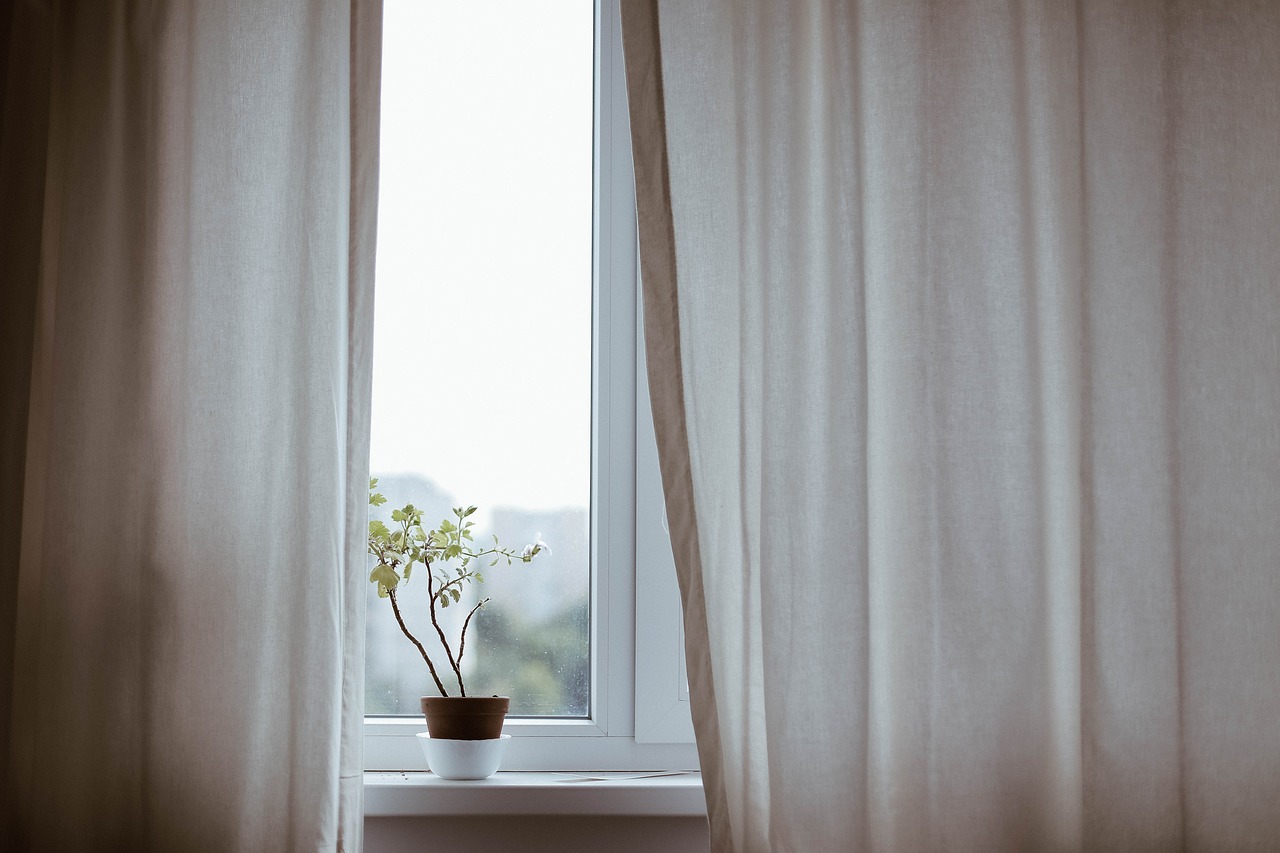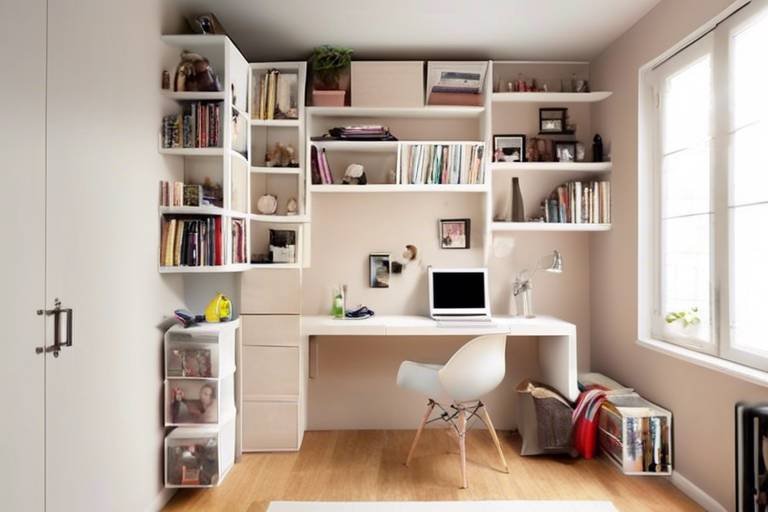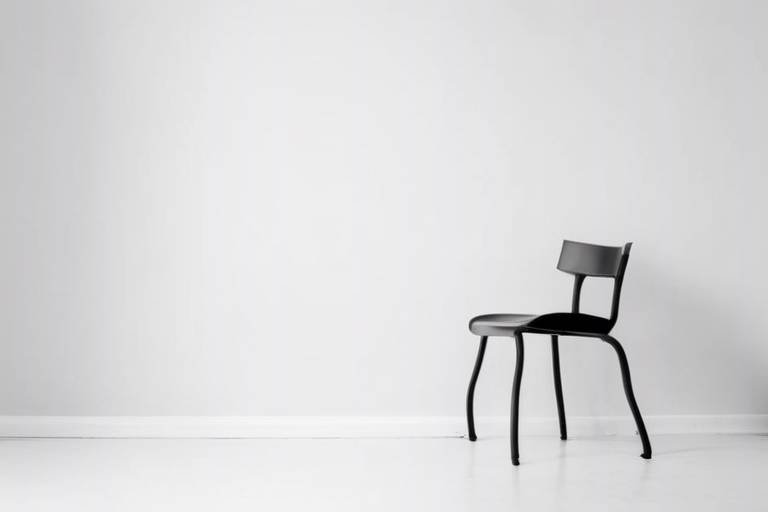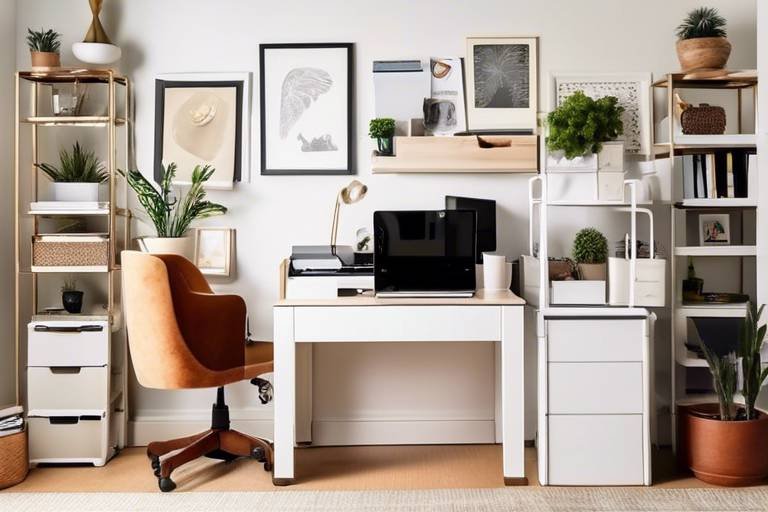The Benefits of Minimalist Living for Stress Reduction
Living a minimalist lifestyle can bring a multitude of benefits, especially when it comes to reducing stress and enhancing overall well-being. By simplifying various aspects of life, one can experience a profound sense of calm and clarity that positively impacts mental health. Let's delve into the ways in which minimalism can transform your life for the better.

Decluttering Your Space
Decluttering your space is not just about tidying up; it's a powerful way to clear your mind and reduce stress. Imagine walking into a room with only the essentials, everything in its place, and no excess clutter to distract you. This visual simplicity can have a profound impact on your mental well-being. Studies have shown that a cluttered environment can lead to increased levels of cortisol, the stress hormone, while a tidy space can promote feelings of calmness and relaxation.
By decluttering and organizing your living environment, you create a harmonious atmosphere that allows you to focus on what truly matters. It's like removing the noise from a crowded room, allowing you to think more clearly and make better decisions. Just as a cluttered desk can hinder productivity, a cluttered living space can impede your ability to unwind and recharge. Simplifying your surroundings can help you feel more in control and at peace with your environment.
Moreover, decluttering is a process of letting go of the past and making room for new experiences. It's a symbolic act of releasing emotional baggage and creating space for growth and positivity. As you rid your space of unnecessary items, you may find yourself feeling lighter and more energized, ready to embrace the present moment with a renewed sense of clarity and purpose.

Embracing Simplicity
This article explores how adopting a minimalist lifestyle can significantly reduce stress levels and improve overall well-being. Discover the various ways in which minimalism can positively impact mental health and promote a sense of calm and clarity in everyday life.
Embracing simplicity is not just about decluttering physical spaces; it's a mindset that can transform your entire life. Imagine your mind as a cluttered room, filled with unnecessary thoughts and distractions. By simplifying your thoughts and actions, you can create more room for what truly matters.
Picture a serene garden with only a few carefully chosen flowers, each one adding beauty and purpose to the landscape. Similarly, simplifying your life allows you to focus on what brings you joy and fulfillment, eliminating the excess that only serves to weigh you down.
When you embrace simplicity, decision-making becomes easier. Just like a streamlined wardrobe filled with only your favorite clothes, a simplified life helps you prioritize what is essential and let go of what no longer serves you. This clarity of purpose can bring a sense of peace and contentment that is hard to find in a cluttered and chaotic existence.
By simplifying your daily routines and commitments, you free up time and energy to focus on self-care and personal growth. Like a minimalist painting that conveys a powerful message with just a few brushstrokes, a simplified life allows you to concentrate on what truly matters, leading to a more meaningful and fulfilling existence.
Q: How can minimalism improve mental health?
A: Minimalism can improve mental health by reducing the mental clutter caused by excess possessions and distractions. It promotes a sense of calm and clarity, leading to reduced anxiety and enhanced focus.
Q: Is minimalism only about decluttering physical spaces?
A: No, minimalism is a holistic approach that involves simplifying all aspects of life, including thoughts, habits, and relationships. It's about focusing on what truly matters and letting go of the rest.
Q: Can minimalism help with financial stability?
A: Yes, minimalism can help you achieve financial freedom by encouraging mindful spending, prioritizing experiences over possessions, and reducing unnecessary expenses.
Q: How does minimalism impact the environment?
A: Minimalism promotes sustainable living by reducing waste production, lowering carbon footprint, and encouraging a more conscious approach to consumption.

Mindful Consumption
This article explores how adopting a minimalist lifestyle can significantly reduce stress levels and improve overall well-being. Discover the various ways in which minimalism can positively impact mental health and promote a sense of calm and clarity in everyday life.
When it comes to mindful consumption, the key lies in being intentional about the things you bring into your life. By carefully considering each purchase and possession, you can cultivate a more fulfilling and stress-free existence. Think of it as curating a collection of items that truly add value and joy to your life, rather than accumulating things for the sake of it.
Imagine your living space as a carefully curated gallery, with each item serving a purpose or sparking joy. By practicing mindful consumption, you not only reduce clutter but also surround yourself with objects that hold meaning and significance. This approach can lead to a greater appreciation for the things you own and a deeper sense of satisfaction with your belongings.
Furthermore, mindful consumption extends beyond material goods to other aspects of life, such as the media you consume, the activities you engage in, and the relationships you nurture. By being mindful of how you allocate your time and energy, you can create a more balanced and harmonious lifestyle that aligns with your values and priorities.
Consider creating a list of your priorities and values to guide your consumption choices. This can help you stay focused on what truly matters to you and avoid getting swept up in the cycle of mindless consumption. Remember, the goal is not to deprive yourself but to enrich your life with purposeful and meaningful experiences.
By embracing mindful consumption, you can cultivate a sense of gratitude for the things you have, make more conscious decisions about what you bring into your life, and ultimately experience a greater sense of fulfillment and peace.
Q: How can minimalism improve mental clarity?
A: Minimalism can improve mental clarity by decluttering both your physical space and your mind, allowing you to focus on what truly matters and reducing distractions.
Q: Is minimalism only about getting rid of possessions?
A: While decluttering is a significant part of minimalism, it also involves simplifying all aspects of life, including relationships, commitments, and daily routines.
Q: Can minimalism help with financial stability?
A: Yes, minimalism promotes mindful spending and prioritizing expenses, which can lead to financial freedom and a more sustainable approach to managing finances.
Q: How does minimalism impact the environment?
A: Minimalism reduces waste production, lowers carbon footprint, and promotes sustainable consumption practices, contributing to a positive environmental impact.

Financial Freedom
Financial freedom is a key aspect of adopting a minimalist lifestyle. By prioritizing spending on what truly matters and letting go of unnecessary material possessions and expenses, individuals can achieve a greater sense of financial security and independence. Minimalism encourages a conscious approach to consumption, focusing on quality over quantity and experiences over possessions.
One of the core principles of minimalism is to live within one's means and avoid unnecessary debt. By embracing a minimalist mindset, individuals can reduce their financial burdens, save more effectively, and work towards long-term financial goals. This shift in perspective can lead to a more sustainable and fulfilling relationship with money, promoting financial stability and peace of mind.
Minimalism also emphasizes the importance of investing in experiences rather than material goods. By redirecting resources towards meaningful activities, travel, and personal growth, individuals can enhance their overall well-being and satisfaction without relying on material possessions for happiness. This shift in focus from acquiring things to experiencing life can lead to a more fulfilling and enriched lifestyle.

Enhanced Mental Clarity
This article explores how adopting a minimalist lifestyle can significantly reduce stress levels and improve overall well-being. Discover the various ways in which minimalism can positively impact mental health and promote a sense of calm and clarity in everyday life.
Enhanced mental clarity is a key benefit of embracing minimalism. By decluttering not just your physical space but also your mind, you can experience a profound sense of focus and reduced anxiety. Imagine your mind as a room filled with unnecessary items, distracting you from what truly matters. Through minimalist living, you can clear out the mental clutter, allowing for enhanced cognitive function and improved decision-making.
Think of your mind like a clear blue sky on a sunny day, free from clouds that obscure your thoughts. Minimalism enables you to prioritize what truly matters, leading to a more organized and efficient thought process. With enhanced mental clarity, you can approach challenges with a calm and focused mindset, making it easier to tackle tasks and navigate daily life with ease.
Moreover, by simplifying your surroundings and reducing the stimuli that compete for your attention, you create a conducive environment for mental clarity to flourish. Just as a clutter-free desk allows you to work more productively, a clutter-free mind enables you to think more clearly and creatively. Minimalist living empowers you to filter out distractions and noise, honing your mental clarity like a finely sharpened blade.
Through mindfulness and intentional living, you can cultivate a peaceful and harmonious inner world that supports mental clarity. By letting go of excess and focusing on what truly brings value to your life, you pave the way for a sharper and more focused mind. Enhanced mental clarity is not just about seeing things more clearly but also about understanding your priorities, goals, and values with greater depth and insight.
In essence, embracing minimalism can act as a mental cleanse, decluttering your thoughts and emotions to reveal a clearer and more focused perspective on life. By simplifying your environment, habits, and mindset, you create space for enhanced mental clarity to thrive, allowing you to approach each day with renewed energy and purpose.
Stay tuned for the frequently asked questions section coming soon!

Healthy Relationships
Healthy relationships are a cornerstone of a fulfilling life, and minimalism can play a significant role in enhancing and nurturing these connections. By prioritizing quality over quantity, minimalism encourages individuals to focus on building deeper and more meaningful relationships with others. Rather than being consumed by material possessions or superficial distractions, minimalism prompts individuals to invest time and effort into fostering genuine connections based on mutual respect, understanding, and support.
One of the key benefits of minimalism in relationships is the promotion of effective communication. By decluttering external distractions and prioritizing meaningful interactions, individuals practicing minimalism can cultivate open and honest communication with their loved ones. This clear and authentic communication fosters trust, strengthens emotional bonds, and helps resolve conflicts in a constructive manner.
Moreover, minimalism encourages individuals to appreciate the people in their lives for who they are rather than for what they own or represent. By valuing experiences and shared moments over material possessions, minimalism promotes gratitude, empathy, and a deeper sense of connection with others. This shift in perspective allows individuals to build stronger, more resilient relationships built on shared values and experiences.
Additionally, minimalism can help set boundaries and prioritize self-care within relationships. By recognizing the importance of personal well-being and mental health, individuals can establish healthy boundaries, communicate their needs effectively, and ensure that their relationships are mutually beneficial and supportive. This emphasis on self-care not only benefits the individual but also contributes to the overall health and longevity of the relationship.
In essence, minimalism in relationships is about quality over quantity, depth over superficiality, and connection over convenience. By embracing the principles of minimalism, individuals can cultivate healthier, more fulfilling relationships based on authenticity, communication, and mutual respect.

Work-Life Balance
Work-life balance is a crucial aspect of overall well-being that can be greatly enhanced through minimalist living. By prioritizing self-care, leisure activities, and meaningful experiences over material pursuits, individuals can achieve a more harmonious equilibrium between their professional and personal lives. Embracing minimalism allows individuals to set boundaries, establish routines that promote relaxation and rejuvenation, and allocate time for activities that nourish the mind, body, and soul.

Environmental Impact
This article explores how adopting a minimalist lifestyle can significantly reduce stress levels and improve overall well-being. Discover the various ways in which minimalism can positively impact mental health and promote a sense of calm and clarity in everyday life.
When it comes to minimalist living, the environmental impact is substantial and positive. By consciously reducing consumption and focusing on essentials, individuals contribute to a more sustainable world. Minimalism encourages a mindset shift towards mindful consumption, leading to lower waste production and a decreased carbon footprint. This lifestyle choice promotes the idea of quality over quantity, emphasizing the importance of long-lasting, environmentally friendly products.
Furthermore, minimalism encourages individuals to consider the lifecycle of their possessions, from production to disposal, promoting a more responsible approach to consumption. By simplifying their lives and reducing unnecessary purchases, minimalists play a part in reducing the strain on the planet's resources. This conscious effort towards sustainability not only benefits the environment but also fosters a greater sense of connection to the world around us.
In essence, embracing minimalism can lead to a more eco-conscious way of living, where every decision is made with the planet's well-being in mind. By minimizing waste, conserving resources, and choosing quality over quantity, individuals who adopt a minimalist lifestyle contribute to a greener, more sustainable future for generations to come.
Q: Is minimalism only about decluttering physical spaces?
A: While decluttering is a significant aspect of minimalism, it goes beyond just physical spaces. Minimalism is a mindset that focuses on simplifying all areas of life, including relationships, finances, and daily routines.
Q: Can minimalism help save money?
A: Yes, minimalism can lead to financial savings by encouraging intentional spending on essentials and reducing unnecessary purchases. By prioritizing what truly matters, individuals can achieve financial freedom and a more fulfilling life.
Q: How does minimalism affect mental health?
A: Minimalism can have a positive impact on mental health by reducing stress, promoting clarity, and fostering a sense of calm. By decluttering both physical and mental spaces, individuals can experience improved focus, reduced anxiety, and enhanced overall well-being.
Q: Is minimalism suitable for everyone?
A: Minimalism is a flexible lifestyle choice that can be adapted to suit individual preferences and circumstances. While the core principles remain the same, the implementation of minimalism may vary based on personal goals and values.
Frequently Asked Questions
- What is minimalist living?
Minimalist living is a lifestyle that focuses on simplicity, mindfulness, and intentional living. It involves decluttering your physical space, simplifying your daily routines, and prioritizing what truly matters to reduce stress and enhance well-being.
- How can minimalist living reduce stress?
By eliminating excess possessions, commitments, and distractions, minimalist living can create a sense of calm and clarity in your life. It helps in reducing decision fatigue, promoting mental clarity, and fostering a more peaceful environment.
- Is minimalism only about decluttering?
While decluttering is a significant aspect of minimalism, it goes beyond just physical possessions. Minimalism is also about simplifying your mindset, focusing on experiences over material goods, and cultivating gratitude and contentment in all areas of life.
- Can minimalist living save money?
Yes, minimalist living can lead to financial freedom by encouraging mindful spending, prioritizing investments in experiences rather than possessions, and reducing unnecessary expenses. It promotes a more conscious approach to money management.
- How does minimalism impact relationships?
Minimalism can improve relationships by encouraging deeper connections, effective communication, and shared experiences. By valuing quality over quantity, minimalism fosters stronger bonds and a greater appreciation for the people in your life.



















